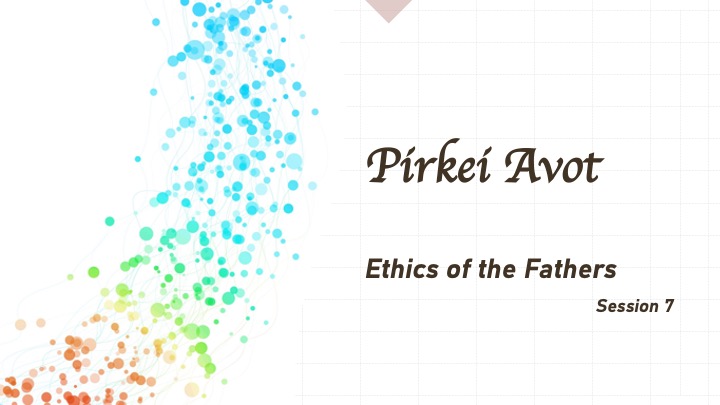Pirkei Avot Lesson 7
Sandy Kress

Ethics of the Fathers – Lesson Plan – Session Seven - WHPC
I. Introduction
II. Verses to Consider
A. Rabban Gamliel said: Beware of rulers, for they befriend someone only for their own benefit; they act friendly when it benefits them, but do not stand by someone in his time of need. 2:3
Questions:
1. What are Gamaliel’s principal concerns and warnings about rulers?
2. Given what Gamliel says, do you have thoughts about how we can best protect ourselves against the abuses of rulers?
3. Now, think more broadly. What forces in our lives operate in a manner similar to that of the rulers that Gamliel is warning us to beware?
B. He (Gamliel) was accustomed to say: Treat His will as if it were your own will, so that He will treat your will as if it were His will. Nullify your will in the face of His will, so that He will nullify the will of others in the face of your will. 2:4
Hillel says: Do not separate yourself from the community; do not believe in your self until the day you die; do not judge your fellow until you have reached his place; do not make a statement that cannot be easily understood, on the ground that it will be understood eventually; and do not say, “When I am free I will study,” for perhaps you will not become free. 2:5
Questions:
1. Walk through the elements of Gamliel’s teaching and explain its message.
2. Hillel carries the discussion further into how we can do our part in service to community. There are five discrete issues he raises. Explain each and its significance. For example, what’s the importance of being easily understood in the statements you make?
3. Can you see a broad, overall purpose to these teachings, taken together? What might it be?
C. He (Hillel) was accustomed to say: A brute cannot be fearful of sin; an ignorant person cannot be scrupulously pious; a timid person cannot learn, nor can an impatient person teach; nor will a person who engages too much in business become wise. In a place where there are no leaders, be a leader. 2:6
Questions:
1. Let’s look at each of these statements and discuss why Hillel’s observations are true – why a brute has difficulty being fearful of sin; why an ignorant person has difficulty being scrupulously pious; and why a person who engages too much in business has difficulty becoming wise.
2. There are several possible understandings of the final, well-known, and important observation that we should be a leader in a place where there are no leaders. What do you think?
III. Conclusion – Takeaways from our study